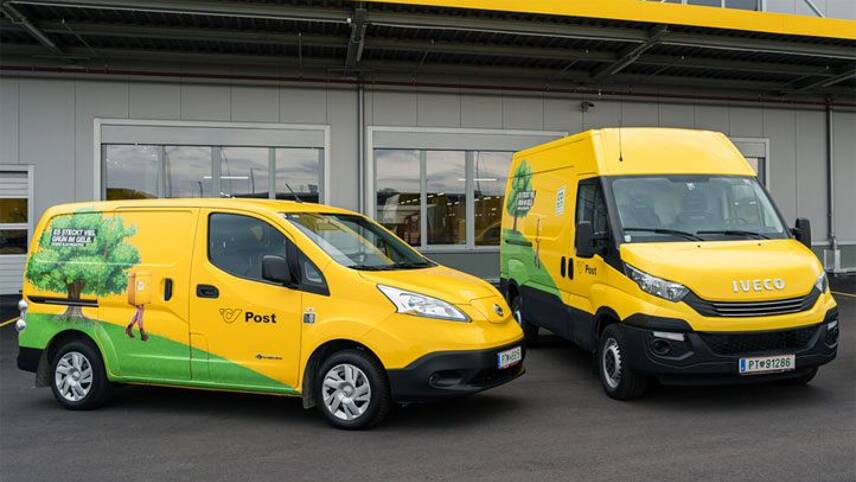Register for free and continue reading
Join our growing army of changemakers and get unlimited access to our premium content

Pictured: Electric delivery vans operated by EV100 member Swiss & Austrian Post
That is according to the organisation’s second annual progress report on EV100, published today (17 February).
The report reveals that 101 businesses are now members of EV100. The scheme’s aim is to help make zero-emission transport “the new normal” by 2030 and most businesses commit to delivering fully electric fleets. Big-name supporters include Unilever, Sky, Coca-Cola European Partners, BT and Ikea.
Collectively, these companies have deployed 169,000 EVs to date, with more than half of vehicle deployments having taken place during 2020. The Climate Group has forecasted that, if all members fulfil their commitments, they will collectively roll-out more than 4.8 million EVs by the end of the decade.
Member companies have also been ramping up ambitions and actions regarding clean energy sourcing and charging infrastructure to power their new EVs. The report reveals that more than half of EV100 members are using 100% renewable electricity for charging, procured either through a tariff, a power purchase agreement (PPA) or by onsite generation.
Moreover, member firms have collectively pledged to install 6,500 new charging locations by 2030. Less than half of this number had been confirmed as of the end of 2019. Some 2,100 of these charging locations have already been installed, totalling 16,900 individual chargers.
“Corporate uptake of electric vehicles is on a roll; despite the uncertainty of 2020, the business community has made remarkable progress in transitioning its fleets,” the Climate Group’s head of transport Sandra Rolling said.
“With the UN climate conference COP26 due in Glasgow at the end of the year, 2021 is the year of climate action. We need businesses to lead from the front.”
Rolling highlighted the fact that most EV100 members have either continued with their fleet electrification plans as usual amid the backdrop of Covid-19, or accelerated delivery timelines. Companies to have joined EV100 during 2020 include Severn Trent, Dixons Carphone, OVO Energy and Tarmac.
Charging ahead
The uptick in EV adoption has been clear to see among individual motorists as well as businesses since Covid-19 was declared a global pandemic. Data published by the Society for Motor Manufacturers and Traders (SMMT) last month revealed that pure EVs accounted for 6.5% of all new cars registered in the UK in 2020, up from 1.5% in 2019. Similar trends have been observed in markets including Norway.
As with last year’s EV100 report, however, The Climate Group has found recurring challenges regarding EV procurement and charging infrastructure, which could affect progress without targeted support from policymakers and the private sector.
On procurement, the report reveals how many EV100 members are having difficulty procuring electric heavy-duty vehicles. Either automakers are not producing them, or the business case does not stack up, as they often bear high upfront costs.
On infrastructure, a recent Policy Exchange briefing outlined how 35,000 charging points will need to be installed annually in the UK to support the 2030 ban on new petrol and diesel cars. In comparison, just 7,000 were installed in 2019. EV100 is present in some 80 markets and many members have reported similar challenges abroad.
Sarah George


Two points concern me in the ambition to turn to electric vehicles.
From where is it envisaged that we can derive the electricity. Most of our power at the moment is moment is generated from carbon based fuel. Renewables, wind and solar are are weak and unreliable. No solar at night!! Perhaps as little as only as only as a few hundred megawatts from wind for days on end.. Nuclear, fission or fusion is of course the answer,, but it is little favoured by the non scientific political body.
Batteries are needed for all ever increasing number of Evs, but who has voiced concern over the very little lithium in the earths crust, and ambition is voiced to replace all the petrol and Diesel engines. And more significantly, all the petrol and diesel! I see no better technology than lithium for batteries, is there any on the horizon?
Am I alone in theses matters?
Richard Phillips